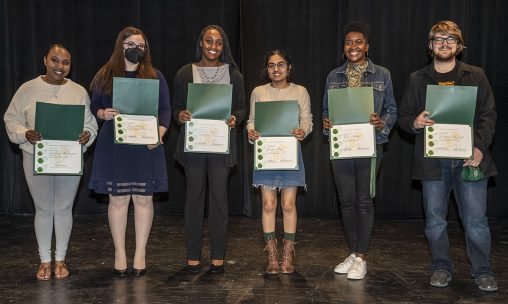
From left: Wright State students Lyndsey Ramsaw, Yara Hakim, Jaylin Biggs, Jeemi Shah, Zavi Odetta, Dominic Wenrick and Sahar Kazmi (not pictured) were honored with peer mentor awards by the Peer Mentorship Council.
Wright State University students were honored for the vital help and support they provide classmates during the inaugural Peer Mentorship Award Ceremony on March 24.
The Peer Mentorship Council honored seven exceptional peer mentors as the Best Peer Mentors for the 2021–2022 academic year. The students were recognized for their accomplishments and commitment to their peers’ growth.
The students who received awards were:
- Jaylin Biggs, senior public health major: Women Student of Color Mentorship and Leadership Cohort
- Yara Hakim, graduate student, M.S. in biomedical engineering and electrical engineering: College of Engineering and Computer Science Student Ambassador Mentor
- Sahar Kazmi, senior biological sciences major: First-Year Programs
- Zavi Odetta, senior acting major: Acting and Musical Theatre Peer Mentor
- Lyndsey Ramsaw, graduate student, M.Ed. intervention specialist program: Peer Success Program Peer Coach
- Jeemi Shah, senior biological sciences major: Study Coaching Peer Mentor
- Dominic Wenrick, senior motion pictures major: LGBTQA Center Peer Mentor
The Peer Mentorship Council is made up of 12 peer mentorship program representatives who work together to foster a spirit of collaboration, share resources and discuss peer mentorship best practices.
Ramsaw previously served as a peer mentor for First-Year Seminars and is now a peer coach in the Peer Success Program. She said she enjoys working as a peer coach because she can have a positive impact on her students.
“I was excited to be a part of it after seeing the motivation and support this program provides to students,” said Ramsaw, who earned a bachelor’s degree in middle childhood education from Wright State.
Mentoring other students has been a rewarding experience for Ramsaw.
“I have learned professionalism, I have learned a lot about myself and how far I have come being in college,” she said, “I have learned how to set boundaries, I have learned emotional intelligence, and lastly, I have enjoyed working with students and giving them my advice and guidance to be successful in college.”
Peer Mentorship Programs connect Wright State students with older classmates for academic assistance and support in navigating the university. Peer coaches are trained on Wright State resources and help connect students to a success coach, advisor or student advocate.
Peer success coaches and academic study coaches are available to all Wright State students regardless of their year. Specialized mentoring programs are also offered for theatre students; first-year students in engineering, computer science, science and mathematics programs; LGBTQA+ students; and undergraduate students who identify as women of color.
Interacting with a peer mentor increases a student’s sense of belonging on campus by creating a built-in peer support system, said Catherine Amaris Hernandez Hogan, a success coach on the Student Retention Team and chair of the Peer Mentorship Council.
“Through peer mentorship, students never have to do the university experience alone,” she said. “A fellow student who has done this before and has been successful can walk alongside and help a student navigate the sometimes tricky and stressful experiences of university life.”
Connecting students with peer mentors can also remove barriers and allow the university to provide early intervention support for students who need it, Hogan said.
“The sooner the university knows the challenge, the better we can intervene to help remove barriers keeping that student from succeeding,” she said.
Interacting with a peer mentor allows students to see what it looks like for a student to model excellence.
“It allows a student to see what success can look like for someone who looks like them,” Hogan said.
Students who would like to be mentored by a fellow student can learn more on the Student Success Resources webpage.

 Wright State to expand nursing facilities to meet workforce needs and prepare more graduates for in-demand careers
Wright State to expand nursing facilities to meet workforce needs and prepare more graduates for in-demand careers  Wright State student-athletes make a lasting impact on local family with more to come
Wright State student-athletes make a lasting impact on local family with more to come  Wright State names Rajneesh Suri dean of Raj Soin College of Business
Wright State names Rajneesh Suri dean of Raj Soin College of Business  ‘Only in New York,’ born at Wright State
‘Only in New York,’ born at Wright State  Wright State president, Horizon League leaders welcome new commissioner
Wright State president, Horizon League leaders welcome new commissioner 